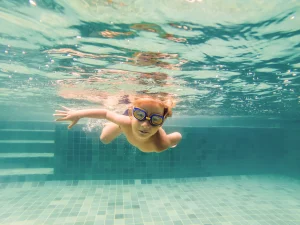The emotional impact of swimming goes beyond physical benefits, becoming essential for well-being and mental health at all ages.
We live in an increasingly fast-paced world where children, teenagers, and adults face academic pressures, professional challenges, sensory overload, and little time for self-care. All of these silently but deeply affect emotional balance.
A study published by PubMed revealed that aquatic activities, such as swimming, significantly reduce symptoms of anxiety and depression. This proves that this sport is a powerful tool for lifelong mental and emotional resilience.
Discover how immersion in water and swimming movements can provide lasting feelings of lightness, balance, and well-being.
Water and the emotional impact of swimming
Did you know that just being near water or in contact with it can be a transformative experience?
Research by BlueHealth with over 18,000 Europeans found that being close to bodies of water improves mood, reduces stress, and increases happiness.
Regarding the emotional impact of swimming, the feeling of lightness, muffled sound, breathing rhythm, and the distancing from external stimuli create an environment of reconnection with the present moment.
For many athletes, both professional and amateur, swimming is a therapeutic break in the midst of daily hustle.
Why does this happen?
The calming effects of water have a scientific basis: immersing the body in water promotes a physiological response called passive immersion.
This stimulates the production of endorphins and serotonin while reducing cortisol. This phenomenon can lower heart rate, activate the parasympathetic nervous system, and improve brain oxygenation.
Additionally, the hydrostatic pressure of water promotes muscle relaxation and contributes to respiratory regulation. As movements must be coordinated, the aquatic environment reduces distractions, promoting focus and mindfulness. It’s as if the body understands that this environment is safe and it can finally slow down its thoughts.
Research indicates that regular swimming practice can:
- Reduce symptoms of mild to moderate anxiety and depression
- Improve sleep quality and mood
- Increase self-esteem and feelings of self-control
- Stimulate the production of endorphins, the pleasure and relaxation hormones
- Promote mindfulness and focus, reducing racing thoughts.
Swimming and calm through breathing
In swimming, breath control is essential. Each stroke and movement needs to be synchronized with respiratory rhythm, requiring focus and body awareness.
This not only enhances athletic performance but also induces a state of mindfulness, similar to what is sought in practices like yoga or meditation.
Connecting with breathing acts as a natural antidote to stress. By consciously breathing, the brain interprets that the body is calm and begins to release less cortisol.
Moreover, swimming helps reduce accumulated muscle tension often caused by anxiety, worries, or emotional overload. It feels like all the weight carried on your shoulders dissolves in the water.
Swimming as a practice of self-care and embracing water

Often, stress arises from lack of time for oneself. Being in the pool is an exclusive moment of self-care. It’s time reserved for the body, silence, and conscious movement. In this space, there is only the relationship with oneself and the water, without external distractions.
Adults who regularly swim report feeling more emotionally balanced and better prepared to face daily challenges. For children and teenagers, the therapeutic benefits of swimming help release tensions from school or social routines.
Psychologically, water carries powerful symbolism: it represents fluidity, renewal, and embrace.
Studies in prenatal psychology suggest that being immersed in water can evoke deep sensory memories linked to the sense of security experienced in the maternal womb. It’s like returning, for a few moments, to a place where everything is in balance.
This perception explains why many people feel emotionally protected while swimming. It’s an experience that calms thoughts, slows internal rhythms, and fosters reconnection with what’s essential.
With so many benefits, you might be wondering: Is it possible to experience all this in my own home?
Transform your home into a space of mental clarity
If swimming is already powerful on its own, imagine the benefits when practiced in the comfort and safety of your own home.
Private lessons at home offer not only convenience but a personalized experience tailored to your physical and emotional needs.
With individualized guidance, you can respect your own pace, work through fears, alleviate stress, and cultivate a gentler relationship with your body. All of this fits your schedule and availability, in a warm and familiar environment.
Here at Easy2Swim, we’ve designed classes entirely to help you slow down and relax without leaving home. Talk to our professionals and schedule a lesson today.






